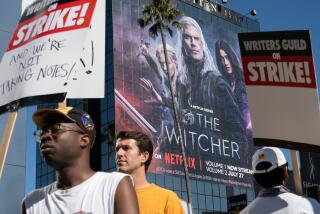Power to YouTube’s people
- Share via
NOT TO RAIN ON Silicon Valley’s parade, but Google’s $1.7-billion acquisition of YouTube isn’t really about the future of advertising, the death of TV or new info-oligopolies. It’s about the triumph of radical left-wing politics -- which means it’s just as likely to subvert business as to support its reinvention.
The YouTube phenomenon boils down to this: The cost of creating and distributing information is trending toward zero. The creation of 6 million YouTube videos -- plus 50 million blogs and 100 million MySpace pages -- represents a remarkable, even revolutionary, democratization of the means of production.
Did someone say “revolution” and “means of production”? Yes, but in a way that would make Karl Marx spin in his grave. The publication of “Das Kapital” in 1867 animated global politics with the theory that the struggle between labor and capital for control of production would lead to unending class conflict and ultimately violent revolution. Underlying all that was the assumption that all production is industrial, requiring concentrated resources.
Even in the postwar, post-industrial era, liberals and conservatives alike held to the conviction that economics was a contest among three sumo wrestlers -- big business, big labor and big government. Tripartite negotiations would determine the happiness and well-being of the polis.
Of course, that drive toward concentration -- both economic and cultural -- has long been matched by an equivalent desire for individual expression and control. Even as the world’s political mainstream proclaimed “big is beautiful,” Marx’s intellectual successors at Germany’s so-called Frankfurt School tentatively raised the banner of individualism, bemoaning the “mechanics of conformity” inherent to industrial organization.
Two decades later in the United States, the Students for a Democratic Society -- the same SDS you may know as an extremist 1960s group -- picked up individualism’s flag. “Men have unrealized potential for self-cultivation, self-direction, self-understanding and creativity,” the SDS architects wrote in their manifesto, the Port Huron Statement.
The SDS’ heirs realized that “do your own thing” had business implications. When author and editor Stewart Brand founded the Whole Earth Catalog in 1968, his purpose was stated on the cover: to provide readers “access to tools” to further their social and economic lives. These tools -- whether mountaineering shoes or a Volkswagen repair manual -- let individuals compete with “specialists and professionals only too eager to turn their knowledge into a saleable commodity,” as philosopher Jay Ogilvy wrote in “Many Dimensional Man,” a 1977 treatise on personal technology whose title intentionally evoked the Frankfurt School.
WHETHER by kings or capitalists, economic development since the dawn of homo economicus has depended on mobilizing resources on an increasingly mass scale, with all others (entrepreneurs and small businesses in particular) denied access. In scarcity and limits lay profits. The Web, the ultimate tool with unlimited access, has overturned such economics. As YouTube founders Chad Hurley and Steve Chen just proved, all you need to make a billion dollars is a great idea, a catchy URL and lots of digital storage space.
But will people predictably and continuously pay for these Web ventures, our latest, wildly proliferating “saleable commodities”? That is not clear at all. Centuries of industrial capitalism transformed citizens into consumers whose “conformity is ensured by their tendency to be sensitized to the expectations and preferences of others,” as the late sociologist David Reisman famously put it. Yet today, tens of millions of us are crafting our own identities on personal websites, in the blogosphere and, oh yes, on YouTube.
Business leaders know this is happening. “Consumers are beginning in a very real sense to own our brands and participate in their creation,” Procter & Gamble Chairman and Chief Executive A.G. Lafley told the Assn. of National Advertisers’ annual meeting earlier this month.
That’s already happened at Web businesses such as YouTube, which are re-created every day by their users. If economists were to turn this into an equation, it might be P2 + AT = C2. Translation: Power to the people + access to tools = the consumer is in control.
But can giant, resource-intensive businesses adapt to this radically decentralized economic principle? Not easily. As Lafley put it: “We need to learn how to let go.” Or, in ‘60s terminology, let it all hang out, go with the flow, turn off your mind, relax and float downstream -- just about the hardest thing for any CEO to do.






